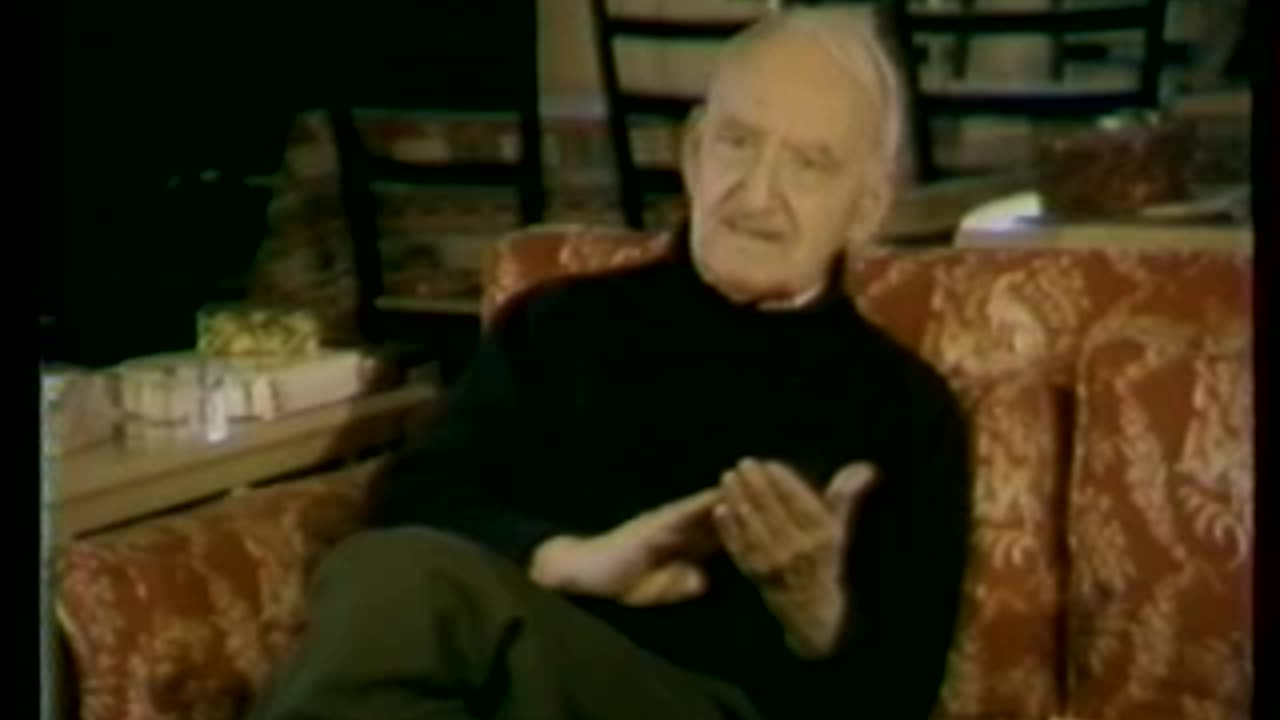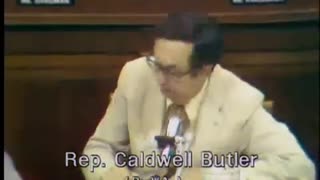Premium Only Content

Exposing Material Ignored and Distorted in the Mainstream Press
The dark side of history: https://thememoryhole.substack.com/
From 1940 to 1950, Seldes published a political newsletter, In Fact which originally had the full name In Fact: For the millions who want a free press[33] and later In Fact: An Antidote for Falsehood in the Daily Press, "a four-page weekly compendium of news other newspapers wouldn't print."[8] Washington Post editor and later press critic Ben Bagdikian and former New York Post reporter Victor Weingarten said, "When Seldes was no longer printed by the mainstream press, he was an important conduit to the journalistic community, who knew that there were flaws in the system, but often couldn't get printed in their own newspapers, because the press cannot be a watchdog on itself. So they fed stories critical of the press to Seldes." Seldes himself said that more than 200 newspapermen gave him stories every week.[34] However, the most commonly used sources were government documents from the Congressional Report, the Federal Trade Commission (FTC), the Federal Communications Commission (FCC) and other specialized public resources, which were seldom relied upon by the mainstream media.[35] At the height of its popularity it had a circulation of 176,000.[29]
One of the first articles published in the newsletter concerned the dangers of cigarette smoking.[4] Seldes later explained that at the time, "The tobacco stories were suppressed by every major newspaper. For ten years we pounded on tobacco as being one of the only legal poisons you could buy in America." At a time when tobacco companies were major advertisers, Seldes discussed the contents of a study, "Tobacco Smoking and Longevity," which he said had been suppressed since 1939.[8] Throughout the 10-year run of In Fact, Seldes published more than 50 stories on the health effects of tobacco and the cigarette industry's attempts at suppressing such news.
Among the favorite targets of In Fact was the National Association of Manufacturers.[4] Defense analyst Daniel Ellsberg, who subscribed to In Fact while an undergraduate at Harvard, said, "I heard about the National Association of Manufacturers first from Seldes and more from Seldes than I ever heard again. If you were to read the press itself, you'd hardly become aware that such organizations existed, that businessmen worked together to pursue their own interests."[36] In Fact also attacked Charles Lindbergh for his Nazi sympathies, the American Legion for helping to break strikes,[8] and labeled many captains of industry as "native fascists." Consumer advocate Ralph Nader said, "[Seldes] used the word fascism to reflect an authoritarian state of mind that tended to stifle free speech and dissent and also tended to believe that might was right."[37]
In Fact immediately attracted the attention of government authorities. President Franklin D. Roosevelt ordered an FBI investigation of Seldes and In Fact in 1940.[38] Articles claiming that the FBI was infiltrating unions and monitoring union activities resulted in FBI surveillance of Seldes and his publication. J. Edgar Hoover sent Seldes a 15-page letter denying such FBI activities.[39] The FBI subsequently questioned In Fact subscribers, particularly servicemen and women, and had U.S. postal officials reporting to the FBI on Seldes' mail correspondence. In Fact lost many of its subscribers in the late 1940s. Seldes later claimed that his critical coverage of Yugoslavia got the publication banned from Communist Party bookstores. The political climate discouraged subscriptions on the part of less ideologically committed readers as well.[39] In Fact ceased publication in 1950. I. F. Stone's Weekly, which started publication in 1953, took In Fact as its model.[8]
In addition to writing his newsletter, Seldes continued to publish books. They included Facts and Fascism (1943) and One Thousand Americans (1947), an account of the people who controlled America. Time called One Thousand Americans "a collection of truths, half-truths and untruths about the U.S. press and industry."[40] One Thousand Americans introduced a wide audience to the Business Plot, a supposed plan of America's corporate elite to overthrow the U.S. government in the early 1930s.[41]
Seldes published The People Don't Know on the origins of the Cold War in 1949.
Politics and later career
According to KGB documents, Seldes was a longtime secret member of the U.S. Communist Party since well before 1940 who was valued for his "major connections" in Washington.[42][43]
Seldes later wrote that In Fact was founded at the instigation of the U.S. Communist Party leadership, but he wrote that the party worked through his partner Bruce Minton (also known as Richard Bransten) without his knowledge. Seldes wrote that he was unaware that Minton was a party member who received the funds to start In Fact from the Communist Party.[ab][44] While his political positions often were similar to those in the Party in 1940, by 1948 Seldes was writing in positive terms of the anti-Soviet communism of Marshal Tito in Yugoslavia, which earned him the wrath of many Communist Party loyalists in the United States. As the Cold War took shape at the end of the decade, Seldes lost readership from both the Communists and the anti-liberal-left sentiment that was sweeping the country, including a trade union movement that had contained some of his largest audience.[45] The nationwide atmosphere of McCarthyism and red-baiting further diminished his subscribers' numbers, and he was financially forced to close In Fact, which never accepted advertising, in October 1950.
Senator Joseph McCarthy subpoenaed Seldes in 1953. Seldes vehemently denied Communist Party membership and was "cleared" by McCarthy's Senate subcommittee, but Seldes's greatest influence on readers had already passed.[46] Seldes did publish Tell the Truth and Run in 1953, but otherwise found it difficult to publish his work throughout the 1950s. He was approached, however, by an old friend and colleague, I.F. Stone, for advice on how to start a small independent investigative newspaper. I.F. Stone's Weekly premiered in 1953, picking up where Seldes had left off.[47]
Largely dropping his own writing, he developed an anthology called The Great Quotations and received rejections from 20 publishers. It sold more than a million copies when it appeared in 1961.[8]
In a letter to Time magazine in 1974, he appraised the state of American journalism as much improved in his lifetime:[48]
The press deserved the attacks and criticisms of Will Irwin (1910) and Upton Sinclair (1920) and the muckrakers who followed, and it needs today the watchdog and gadfly activities of the new critical weeklies, but all in all it is now a better medium of mass information ... The 1972 Watergate disclosures, it is true, were made by only a score of the members of the mass media, but I remember Teapot Dome when only one of our 1,750 dailies (the Albuquerque Morning Journal) dared to tell the truth about White House corruption. We have come a long way since.
He published Never Tire of Protesting in 1968 and Even the Gods Can't Change History in 1976.
The Association for Education in Journalism gave him an award for professional excellence in 1980.[4] In 1981 he received the George Polk Award for his life's work.[9]
He published his autobiography, Witness to a Century in 1987. He wrote, "And so [my brother] Gilbert and I, brought up without a formal religion, remained throughout our lifetimes just what Father was, freethinkers. And, likewise, doubters and dissenters and perhaps Utopians. Father's rule had been 'Question everything, take nothing for granted,' and I never outlived it, and I would suggest it be made the motto of a world journalists' association."[49]
In 1981, Seldes appeared in Warren Beatty's Reds, a film about the life of journalist John Reed. Seldes appears as one of the film's "witnesses" commenting on the historical events depicted in the film.
Seldes served on the board of Fairness and Accuracy in Reporting (FAIR).[10]
Martin A. Lee and Norman Solomon used a quote from Seldes as an epigraph for their book Unreliable Sources: "The most sacred cow of the press is the press itself."
-
 8:57:26
8:57:26
The Memory Hole
18 days agoNixon Impeachment Hearings Day 7 (1974-07-30)
461 -
 LIVE
LIVE
Glenn Greenwald
1 hour agoGlenn From Moscow: Russia Reacts to Trump; Michael Tracey Debates Ukraine War | SYSTEM UPDATE #413
2,514 watching -
 LIVE
LIVE
Wahzdee
4 hours agoSniper Elite Then Extraction Games—No Rage Challenge! 🎮🔥 - Tuesday Solos
1,076 watching -
 2:12:58
2:12:58
Robert Gouveia
3 hours agoSenator's Wife EXPOSED! Special Counsel ATTACKS; AP News BLOWN OUT
29.7K25 -
 55:07
55:07
LFA TV
1 day agoDefending the Indefensible | TRUMPET DAILY 2.25.25 7PM
4.89K1 -
 6:09:26
6:09:26
Barry Cunningham
10 hours agoTRUMP DAILY BRIEFING - WATCH WHITE HOUSE PRESS CONFERENCE LIVE! EXECUTIVE ORDERS AND MORE!
46.4K37 -
 1:46:37
1:46:37
Game On!
5 hours ago $2.51 earnedPUMP THE BRAKES! Checking Today's Sports Betting Lines!
19.9K1 -
 1:27:21
1:27:21
Redacted News
4 hours agoBREAKING! SOMETHING BIG IS HAPPENING AT THE CIA AND FBI RIGHT NOW, AS KASH PATEL CLEANS HOUSE
142K180 -
 1:08:28
1:08:28
In The Litter Box w/ Jewels & Catturd
1 day agoCrenshaw Threatens Tucker | In the Litter Box w/ Jewels & Catturd – Ep. 749 – 2/25/2025
77.7K43 -
 44:57
44:57
Standpoint with Gabe Groisman
1 day agoWill Byron Donalds Run for Florida Governor? With Congressman Byron Donalds
35.1K6